Divadelní noviny > Burza Zahraničí
Zemřel Carlo Bergonzi
Minulý týden zemřel italský tenorista Carlo Bergonzi, jedna z největších hvězd generace, jež předcházela éře Pavarottiho, Dominga a Carrerase. Právě na něj „tři tenoři“ navazovali a jím nasazená pěvecká měřítka platí dodnes.
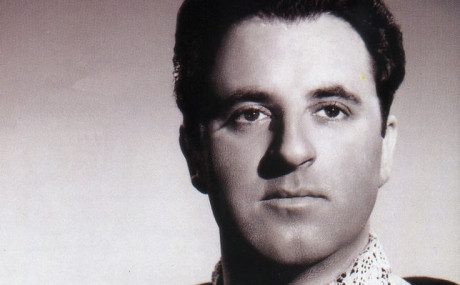
FOTO archiv
13. 7. 1924 Polisene, Itálie – 25. 7. 2014 Milán, Itálie
Although he performed and recorded some bel canto and verismo roles, he was above all associated with the operas of Giuseppe Verdi, including a large number of the composer’s lesser known works that he helped revive. Additionally, he sang more than 40 other roles throughout his career. Bergonzi is considered as one of the 20th century’s most distinguished operatic tenors.
Bergonzi was born in Polisene, near Parma in Northern Italy. He was an only child. He later claimed he saw his first opera, Verdi’s „Il Trovatore“, when he was six years old. He sang in church, and soon he began to appear in children’s opera roles in Busetto, a nearby town. After he left school at age 11 he began working in a Parma cheese factory. His father worked there too, and Carlo often got into trouble for singing. At the age of 16, he began his vocal studies as a baritone at Arrigo Boito Conservatory in Parma with Maestro Ettore Campogalliani.
During World War II, Bergonzi became involved in anti-Nazi activities and was interned in a German prisoner-of-war camp in 1943. Two year later, he was freed by the Russians and walked 106 km in order to reach an American camp. However, while on his way, he drank unboiled water and contracted typhoid fever, from which he recovered within a year. After the war he returned to the Arrigo Boito Conservatory in Parma, Italy, weighing just over 36 kilograms.
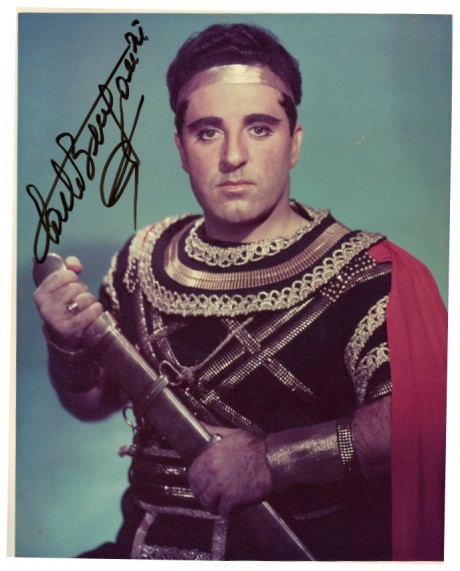
Repro archiv
In a 1985 interview with Opera Fanatic’s Stefan Zucker, Bergonzi cited 1948 as the date of his professional debut, as a baritone. He sang the role of Figaro in Rossini’s The Barber of Seville, which he performed with a former prisoners‘ association which he joined after the war. It has been noted that the fee of 2,000 lire paid for his professional debut was insufficient to cover his meal and travel.
Other baritone roles which he undertook included those of Metifio in L’arlesiana, Doctor Malatesta in Don Pasquale, Belcore in L’elisir d’amore, Enrico Ashton in Lucia di Lammermoor , Ghirlino in Le astuzie di Bertoldo, Silvio in Pagliacci, David in L’amico Fritz, Alfio in Cavalleria rusticana, Albert in Werther, Marcello in La bohème, Sonora in La fanciulla del West, Sharpless in Madama Butterfly, Lesscaut in Manon Lescaut, Laerte in Mignon, the title role in Rigoletto, and Georgio Germont in La traviata.
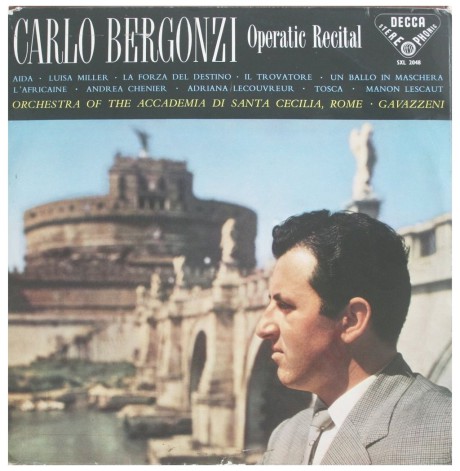
Repro archiv
However, he realized that the tenor repertoire was more suited to his voice, and after retraining, he made his debut as a tenor in the title role of Andrea Chénier at the Teatro Petruzzelli in Bari in 1951. That same year, Bergonzi sang at the Coliseum in Rome in a 50th anniversary concert of Verdi’s death and the Italian state radio network RAI engaged Bergonzi for a series of broadcasts of the lesser-known Verdi operas for the same purpose. These included I due Foscari as well as Giovanna d’Arco and Simon Boccanegra.
In 1953, Bergonzi made his La Scala debut, creating the title role in Jacopo Napoli’s opera Mas‘ Aniello which was based on the life of Tommaso Aniello, the 17th-century Italian fisherman-turned-revolutionary. His London debut as Alvaro in La forza del destino took place at the Stoll Theatre in 1953. His American debut was at the Lyric Opera of Chicago in 1955, and his Metropolitan Opera debut as Radames in Aida came the following year when he (and Antonietta Stella) received a positive reaction from Howard Taubman in The New York Times. Bergonzi continued to sing at the Met for 30 years, his last role being that of Rodolfo in Verdi’s Luisa Miller in 1988.
He sang the role of Radames again for his debut with the Philadelphia Lyric Opera Company in 1961 and in 1962 he reprised the role of Alvaro for his debut with the Royal Opera, Covent Garden. He made his debut with the San Francisco Opera in 1969 as Don Alvaro in La forza del destino.
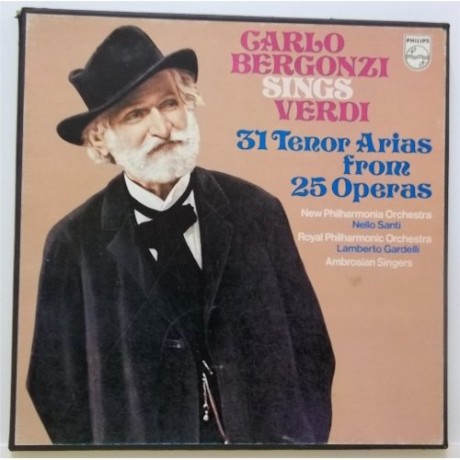
Repro archiv
Bergonzi pursued a busy international career in the opera house and recording studio during the 1960s. His chief Italian tenor rivals in this period were Franco Corelli and Mario Del Monaco. Bergonzi outlasted all three, continuing to sing through the 1970s at major opera houses. But in the 1980s, as his own vocal quality deteriorated inevitably with age, he concentrated on recital work. In 1996, Bergonzi participated in conductor James Levine’s 25th anniversary gala at the Metropolitan Opera. He gave his American farewell concert at Carnegie Hall on 17 April that same year.
However, an announcement that on 3 May 2000, he was to sing the title role in a concert performance of Verdi’s Otello, conducted by Eve Queler and the Opera Orchestra of New York, attracted intense interest, particularly because he had never performed the demanding role on stage. Amonst others, the audience included Anna Moffo, Licia Albanese, Sherrill Milnes, José Carreras, Plácido Domingo and Luciano Pavarotti. Bergonzi was unable to finish the performance, supposedly suffering irritation from the air-conditioning in his dressing-room. He withdrew after two acts, leaving the remaining two to be sung by Antonio Barasorda, a substitute singer. This performance was by wide critical consensus seen as a disaster.
After retiring, Bergonzi is credited with mentoring tenors Roberto Aronica, Giuliano Ciannella, Berle Sanford Rosenberg, Vincenzo La Scola, Filippo Lo Giudice, Philip Webb, Giorgio Casciari, Paul Caragiulo, Lance Clinker, Fernando del Valle and Salvatore Licitra. Soprano Frances Ginsberg was also one of his pupils.
Bergonzi left a legacy of many recordings of individual arias and complete operas, including works by Verdi, Puccini, Mascagni and Leoncavallo. However, of his early baritone roles, few of his audio recordings still exist.
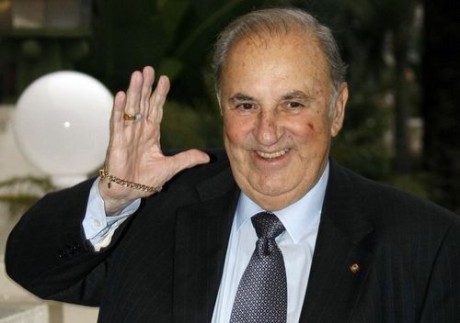
V roce 2009. FOTO archiv
In 1950 Bergonzi married Adele Aimi, with whom he had two sons, Maurice and Mark; the former was born on the day Bergonzi made his tenor debut. Bergonzi owned homes in both Milan and Busseto, in addition to a restaurant and hotel in the latter, the „I Due Foscari“, named after the Verdi opera about Venetian court intrigue.
Carlo Bergonzi passed away on Friday July 25 in the Auxologico Institution in Milan, where he had been hospitalized. Mr. Bergonzi will be laid to rest in the Vidalenzo Cemetery, which is situated within his birthplace of Polesine.
/Převzato z Wikipedie/
Komentáře k článku: Zemřel Carlo Bergonzi
Přidat komentář
(Nezapomeňte vyplnit položky označené hvězdičkou.)




